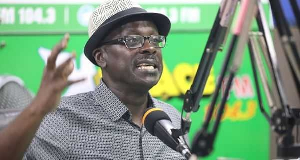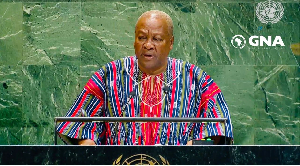Business News of Thursday, 1 September 2005
Source: GNA
West African Monetary Zone meeting underway
Accra, Sept. 1, GNA- Vice President Alhaji Aliu Mahama, on Thursday noted that the exogenous political and economic forces and rigid economies in West Africa had undermined the convergence criteria for macroeconomic stability in the Sub-Region.
He said since its inception, only the Gambia had met all four primary convergence criteria consistently, adding, "even so, by 2004, the Gambia along with Nigeria could only come close to three of the primary criteria".
Alhaji Mahama made the observation when he addressed the meeting of the Convergence Council of Ministers and Governors of the West African Monetary Zone (WAMZ) in Accra.
"We need to do more to diversify our economies and thereby reduce dependence on the fickle international markets for primary commodities," he said.
"Investment, whether foreign or local, must be provided in an environment in which it is effectively planted and protected, nurtured and harvested in the form of profits. Efficient regulation is central to achieving that environment in which investment thrives and generate growth and income."
The Convergence Council is one of the four institutional organs of the multilateral surveillance mechanism of the Economic Community of West African States (ECOWAS).
The delegates would endorse Mr Kwadwo Baah Wiredu, Minister of Finance and Economic Planning as the new Chairman of the Council and consider the report of the 15th meeting of the Committee of the Governors of Central Banks of the WAMZ in Accra. The chairmanship rotates among Ministers of Finance of member countries every three months.
The Vice President asked the meeting not to limit itself to tracking and controlling of the primary indicators of economic performance, but also to downstream activities of financial information generation and analysis, access and flexibility of financial instruments traded on local markets and even more significantly, the quality of training for finance professionals.
"These areas impact on the attitudes of the people to money. Whether people save or consume, invest in bond markets or small retail operations, engage in new joint ventures or remain in individual operations depend on how comfortable the formal organized financial environment makes them.
Alhaji Mahama cautioned that financial regulation that did not bring up small-scale entrepreneurs to a formal level, where they could partner incoming investments would not succeed in achieving the aim of sustainable macro stability.
"It is, therefore, very important to review our approach to fiscal and monetary policy within the context of the tried and tested but sensitive to the peculiarities of our people and rigid nature of economies.
"This could be a more practical path to achieving the goal of full monetary union by the new date of December, 1, 2009".
Dr Mohammed Ibn Chambas, Executive Secretary of ECOWAS, said the multilateral surveillance mechanism was a West African initiative that predated but was in conformity with the objectives of the New Partnership for Africa's Development (NEPAD).
"Specifically this ECOWAS initiative is based on the NEPAD codes and principles of economic good governance; sound and stable monetary and financial policies, fiscal and budget transparency, sound public debt management, international accounting and auditing standards and strict banking supervision.
He said ECOWAS was taking steps to strengthen relations with the Bretton Woods institutions and other development partners through dialogue and regular consultations.
Dr Chambas said a consultative meeting between the two bodies was scheduled for September 26, in the US where issues of Regional policy initiatives designed to be part of national policies and programmes would be discussed.
He said the single currency initiative was critical to the Regional programme, which was part of the overall challenge of promoting the 30-year old vision of ECOWAS founding fathers: an improved and sustainable standards of living for all the peoples of West Africa. Mr Alieu Ngum, The Gambian Secretary of State for Finance and Economic Affairs, the outgoing Chairman of the Council, said in a speech read on his behalf asked the meeting to deliberate on the legislative requirements needed to facilitate the progress of the monetary programme.












